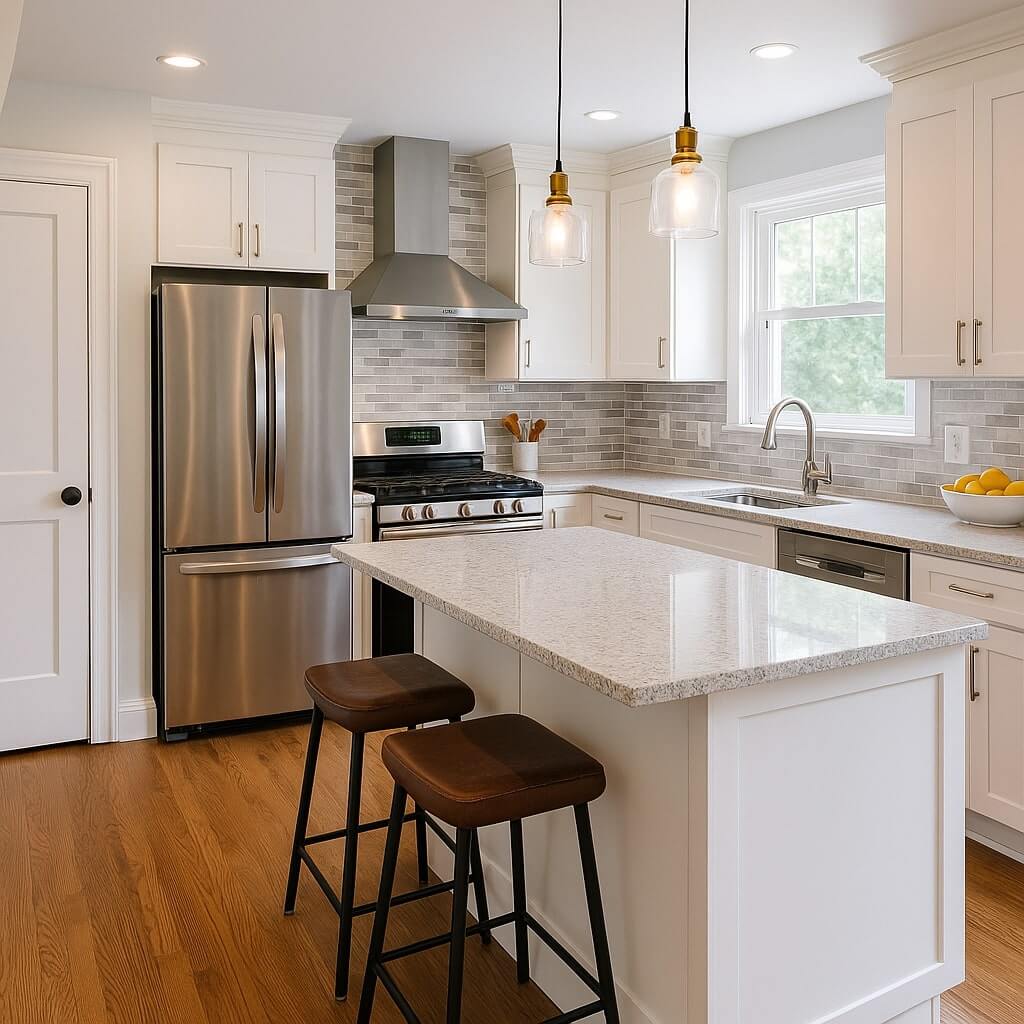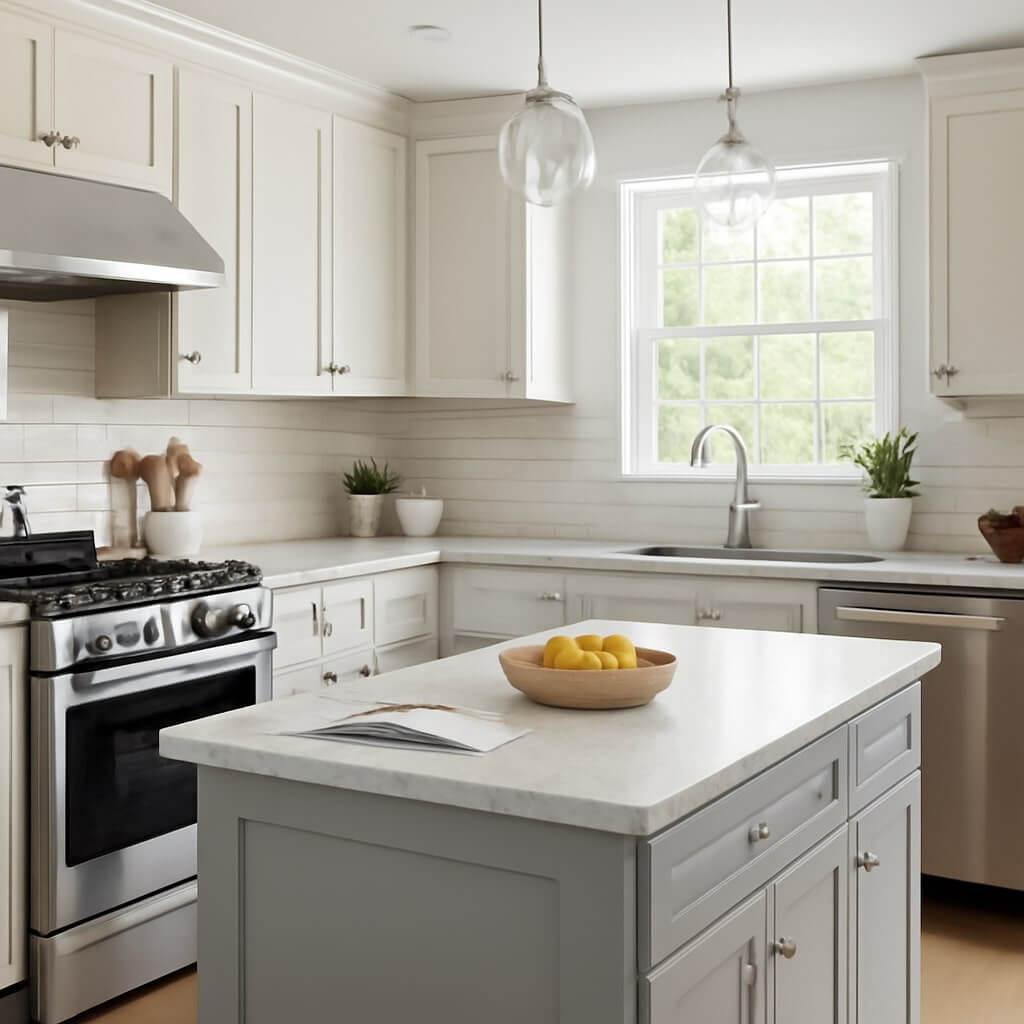If you’re planning a kitchen remodel in Toronto, it’s vital to start with a solid understanding of your costs. You’ll want to examine your current layout and pinpoint what changes will enhance functionality. From there, defining your goals and researching local market prices will help set realistic expectations. Crafting a detailed budget is essential, but don’t overlook the importance of getting multiple contractor quotes. These steps can greatly impact your project’s success. What comes next?
Key Takeaways
- Assess the current kitchen layout to identify functionality and space optimization needs before estimating costs.
- Define remodeling goals, including style and layout changes, to guide budget allocation effectively.
- Research average costs in Toronto by analyzing local market prices and visiting showrooms for materials.
- Create a detailed budget that includes key expenses and a contingency fund for unexpected costs.
- Obtain multiple quotes from contractors, ensuring they specify materials, labor, and timelines for accurate comparison.
Assess Your Current Kitchen Layout
When planning a kitchen remodel, the first step is to assess your current kitchen layout.
Take a good look at your kitchen functionality—are the work zones convenient? Identify any bottlenecks that impede workflow.
Consider how you use the space daily; this will guide your design decisions. Measure your kitchen dimensions and note where you can achieve space optimization.
Are there areas that feel cramped or underutilized? Think about incorporating multifunctional furniture or appliances that can enhance efficiency.
Define Your Remodeling Goals
What do you want to achieve with your kitchen remodel? Defining your remodeling goals is essential for a successful project.
Consider your desired kitchen style—do you envision a modern, minimalist space or a cozy, traditional atmosphere? Think about how the new layout will enhance functionality and flow.
Establish a realistic project timeline, factoring in design, permits, and construction phases. This clarity helps you stay focused and aligned with your vision, ensuring that choices regarding materials and finishes reflect your aspirations.
Research Average Costs
To get a realistic picture of your kitchen remodel costs, start by analyzing local market prices.
This means checking what similar projects are going for in your area, so you understand the going rates.
Next, compare estimates from different contractors to guarantee you’re getting the best value for your investment.
Analyze Local Market Prices
As you commence your kitchen remodel, understanding local market prices is essential for budgeting effectively.
To guarantee you stay informed about local pricing and market trends, consider these steps:
- Conduct Online Research: Browse websites and forums to gather information on typical costs in your area.
- Visit Showrooms: Check out local showrooms to see materials and appliances available and their price ranges.
- Network with Homeowners: Speak with friends or neighbors who recently remodeled to gain insights into their expenses.
Compare Contractor Estimates
While you’re gathering estimates for your kitchen remodel, comparing contractor quotes is essential to confirm you’re getting a fair price.
Start by looking at contractor reputation; check online reviews and ask for references. This helps confirm you’re choosing someone reliable.
Next, focus on estimate accuracy—confirm each quote outlines labor, materials, and timelines. Don’t hesitate to ask contractors for clarification on any vague pricing.
Once you have a few estimates, you can identify patterns in costs, allowing you to make informed decisions.
Ultimately, understanding these figures empowers you to negotiate and select the best contractor for your project.
Create a Detailed Budget
To create a detailed budget for your kitchen remodel, start by identifying key expenses like cabinetry, appliances, and labor costs.
Once you’ve outlined these essentials, be sure to allocate contingency funds for unexpected issues that might arise during the project.
This approach will help you stay on track financially and avoid surprises down the line.
Identify Key Expenses
When commencing a kitchen remodel, identifying key expenses is essential to creating a realistic budget that reflects your vision without breaking the bank.
Start by outlining the main costs involved:
- Kitchen Materials: Choose quality cabinets, countertops, and flooring that fit your design and budget.
- Appliance Selection: Prioritize essential appliances, balancing cost with energy efficiency and functionality.
- Labor Costs: Factor in hiring skilled professionals for installations, plumbing, and electrical work.
Allocate Contingency Funds
How can you guarantee your kitchen remodel stays on track financially? By incorporating contingency planning into your budget.
Set aside 10-15% of your total remodel costs for unforeseen expenses, like plumbing issues or material price increases. This allows for budget flexibility, ensuring you won’t have to compromise on quality or features if surprises arise.
Review your budget regularly, and adjust as needed, so you can respond proactively to any changes. Remember, a well-prepared budget includes a safety net, helping you navigate the unexpected while keeping your dream kitchen within reach.
Don’t overlook this essential step in your planning!
Factor in Labor Costs
While planning your kitchen remodel, it’s essential to factor in labor costs, as these can greatly impact your overall budget. The labor market in Toronto can fluctuate, so understanding these costs is vital.
Here are three key considerations:
- Contractor Experience: More experienced contractors may charge higher rates, but their expertise can save time and reduce mistakes.
- Project Complexity: Complex designs may require specialized skills, impacting labor costs.
- Timeframe: A tight deadline can increase labor costs due to overtime or expedited services.
Consider Unexpected Expenses
Although you might’ve a well-structured budget in mind for your kitchen remodel, it’s crucial to account for unexpected expenses that can arise during the process.
Hidden costs, like plumbing issues or electrical upgrades, often sneak up on homeowners. To prepare, consider setting aside an emergency fund of at least 10-20% of your overall budget.
This way, you’re not caught off guard if something goes wrong. By planning for these potential surprises, you’ll maintain control over your finances and guarantee your remodel stays on track, no matter what challenges you face along the way.
Get Multiple Quotes From Contractors
Before you settle on a contractor for your kitchen remodel, it’s essential to get multiple quotes to confirm you’re making an informed decision.
Getting multiple quotes is crucial for choosing the right contractor for your kitchen remodel.
This process not only helps you understand the market rate but also fosters better contractor communication.
Here are three key steps to follow:
- Research Local Contractors: Look for reputable professionals with positive reviews.
- Request Detailed Quotes: Make sure each quote specifies materials, labor, and timelines for accurate quote comparisons.
- Evaluate Communication Styles: Pay attention to how clearly and promptly each contractor responds, as effective communication is vital for a successful remodel.
Conclusion
By following these seven essential steps, you’ll be well-equipped to estimate your kitchen remodel costs in Toronto. Take the time to assess your current layout and clearly define your goals. Don’t forget to research average costs and create a thorough budget, accounting for both labor and unexpected expenses. Gathering multiple quotes from contractors guarantees you get the best deal. With careful planning, you can transform your kitchen into a space that meets your needs and exceeds your expectations.




